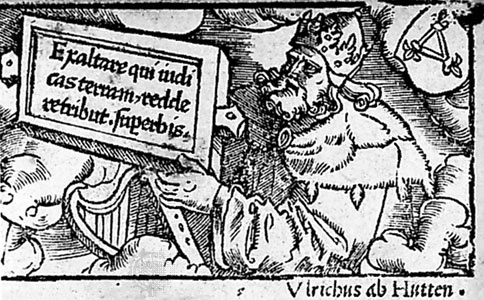Ulrich von Hutten
German knight
born April 21, 1488, near Fulda, Abbacy of Fulda
died Aug. 29?, 1523, near Zürich
 Franconian knight and Humanist, famed as a German patriot, satirist, and supporter of Luther's cause. His restless, adventurous life, reflecting the turbulent Reformation period, was occupied with public and private quarrels, pursued with both pen and sword.
Franconian knight and Humanist, famed as a German patriot, satirist, and supporter of Luther's cause. His restless, adventurous life, reflecting the turbulent Reformation period, was occupied with public and private quarrels, pursued with both pen and sword.As a supporter of the ancient status of the knightly order (Ritterstand), Ulrich looked back to the Middle Ages; but as a writer he looked forward, employing the new literary forms of the Humanists in biting Latin dialogues, satirizing the pretensions of princes, the papacy, Scholasticism, and obscurantism. He was the main contributor to the second volume of the Epistolae obscurorum virorum (1515–17; “Letters of Obscure Men”), a famous attack on monkish life and letters. As a patriot, he envisioned a united Germany and after 1520 wrote satires in German. His vigorous series of satiric pamphlets on Luther's behalf, which first were published in Latin, were subsequently translated into German in his Gesprächbüchlein (1522; “Little Conversation Book”).
Ulrich joined the forces of Franz von Sickingen (Sickingen, Franz von) (q.v.) in the knights' war (1522) against the German princes. On the defeat of their cause he fled to Switzerland, where he was refused help by his former friend Erasmus. Penniless and dying of syphilis, he was given refuge by Huldrych Zwingli.
The legend of Ulrich as a warrior for freedom has been much romanticized in German literature, notably by C.F. Meyer in Huttens letzte Tage (1871; “Hutten's Last Days”).
- public relations
- Public Safety, Committee of
- public school
- public utility
- Public Works Administration
- Public Works of Art Project
- Publilius Syrus
- publishing, history of
- Publius Annius Florus
- Publius Claudius Pulcher
- Publius Clodius Pulcher
- Publius Clodius Thrasea Paetus
- Publius Cornelius Lentulus
- Publius Cornelius Lentulus Spinther
- Publius Cornelius Scipio
- Publius Helvius Pertinax
- Publius Herennius Dexippus
- Publius Licinius Crassus Dives Mucianus
- Publius Mucius Scaevola
- Publius Nigidius Figulus
- Publius Quinctilius Varus
- Publius Septimius Geta
- Publius Sulpicius Rufus
- Publius Valerius Cato
- Publius Ventidius